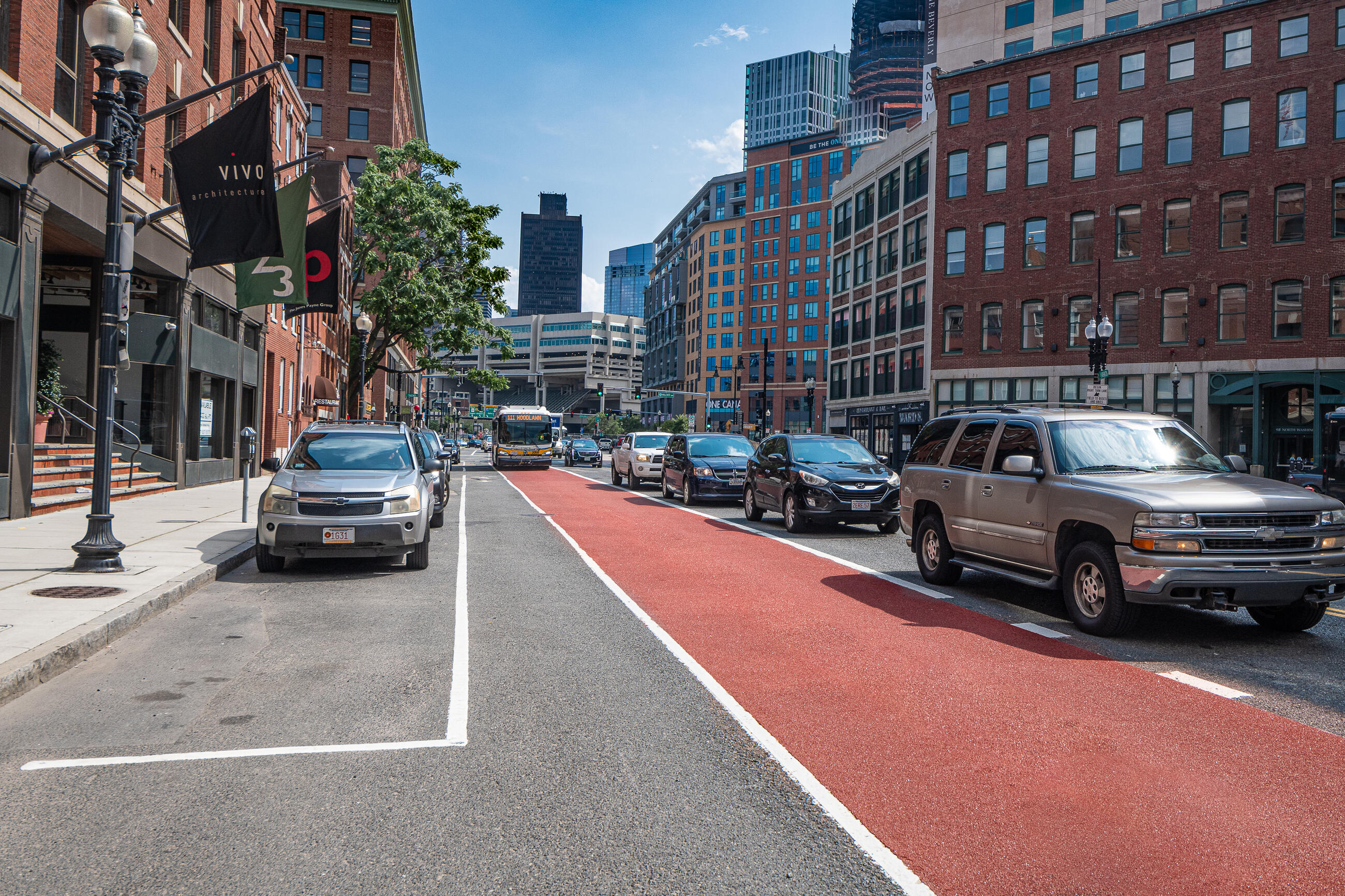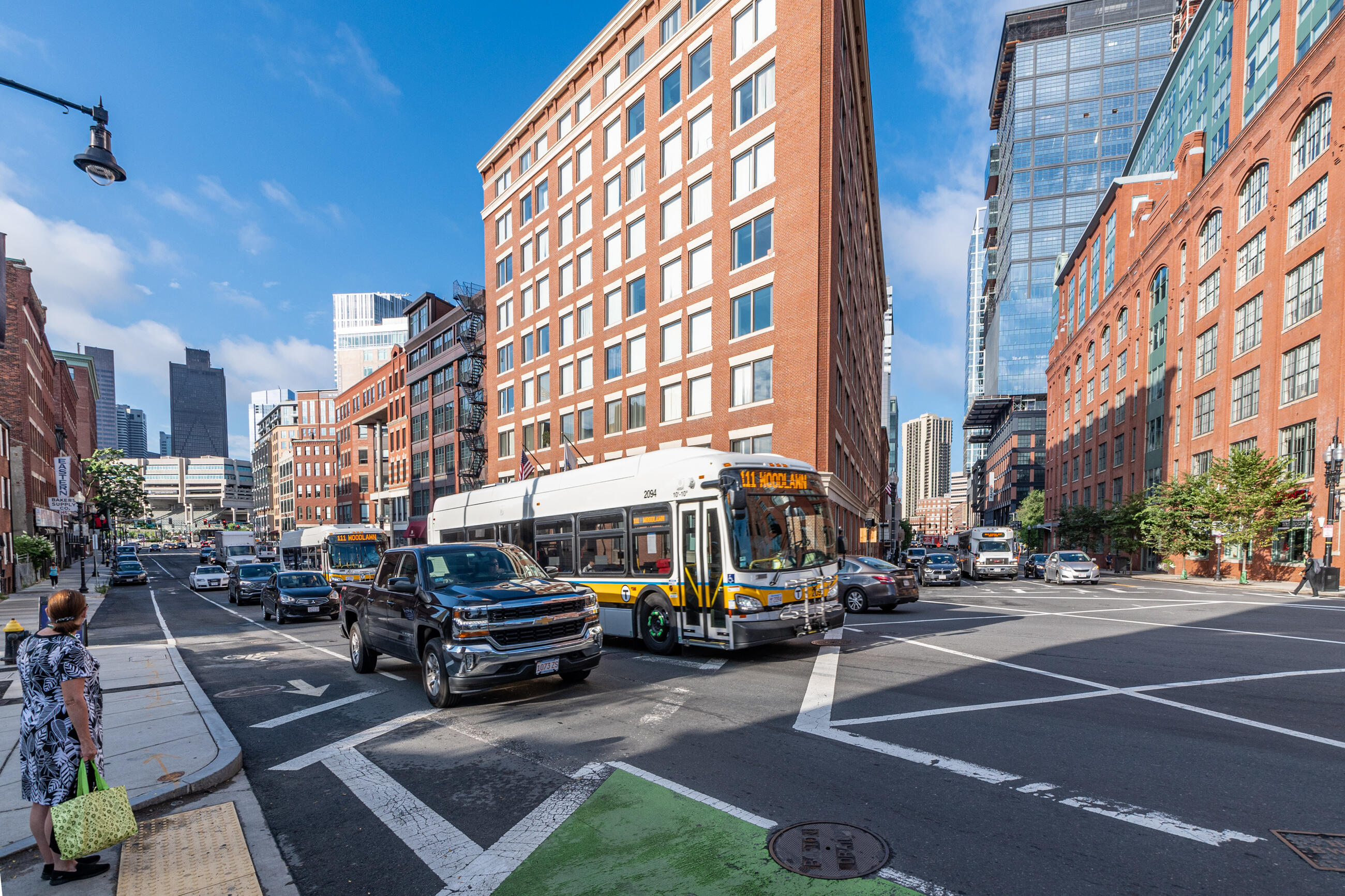MassDOT, MBTA, and City of Boston Announce The Completion of a New Outbound Bus Lane on North Washington Street To Improve Commutes for Thousands of Riders as The Region Re-opens
Posted on August 24, 2021
New transit priority facility includes an all-day bus-only lane northbound from Sudbury Street to Causeway Street in Boston’s North End, benefitting approximately 9,500 riders who rely upon Bus Routes 92, 93, and 111.

MassDOT, the MBTA, and the City of Boston today announced the completion of a northbound bus lane on North Washington Street in the North End between Sudbury Street and Causeway Street. Paired with a corresponding southbound bus lane completed in 2018, this bus lane provides riders of Routes 92, 93, and 111 priority from the North Washington Street Bridge to Haymarket Station. The North Washington Street Bridge will also include a southbound bus lane once construction is complete in 2023. The northbound bus lane goes into effect immediately.
This project is a key component of the MBTA’s Rapid Response Bus Lane Program, a major initiative to improve bus service in the wake of the pandemic, and the City of Boston’s Healthy Streets initiative, an effort to respond to the COVID-19 crisis by doubling down on the City’s Go Boston 2030 goals: equity, economic opportunity, and climate responsiveness. It received funding through MassDOT’s Shared Winter Streets and Spaces grant program, which aims to improve traffic and transit conditions in support of public health, safe mobility, and renewed commerce across the Commonwealth.
“This new bus lane on North Washington Street in Boston demonstrates what has been a hallmark of Governor Baker and Lt. Governor Polito’s Administration and leadership – listening to people and communities about what their needs are, offering support, and partnering on projects,” said Transportation Secretary and CEO Jamey Tesler. “The Administration is committed to providing safe and equitable transportation networks that support the Commonwealth’s transit, economic, climate, and public health goals.”
“This project was at the top of our list for our Rapid Response Bus Lane Program,” said MBTA General Manager Steve Poftak. “The Route 111 bus has consistently been one of the most durable routes by ridership throughout the pandemic. It is one of the top four busiest routes in the system. Having an all-day bus lane for this last leg from Haymarket Station is vital for improving safe, reliable connections for Chelsea commuters transferring to rapid transit.”
“As we continue to plan for an equitable recovery from the COVID-19 pandemic, it’s important now more than ever for safer, more predictable transit options to and from Haymarket, as well as across the city,” said City of Boston Mayor Kim Janey. “We have seen great successes on the southbound bus lane on North Washington Street, and we know that a northbound lane will be key for enabling more reliable service for the North End, Charlestown, and our neighbors in Chelsea. Thank you to all of our partners for making this a reality.”
In partnership with the cities of Boston, Somerville, Everett, and Chelsea in August 2021, the MBTA announced the Rapid Response Bus Lane Program, which is a set of up to 14 miles of bus lanes to be constructed over the course of 2020 and 2021. Through the construction of these bus lanes, the Rapid Response Bus Lane Program aims to improve reliability for high ridership routes and better ensure safe social distancing conditions for bus riders and operators. In concert with other recently completed bus priority projects toward the end of 2020, including the bus lane pilot on Broadway in the City of Chelsea and the inbound bus lane pilot on the Tobin Bridge, the facility provides Route 111 riders with the most bus lanes as compared to other MBTA bus services.

The MBTA’s Rapid Response Bus Lane Program is based on close partnerships with state and municipal roadway owners, and several other projects are slated for completion this summer. Design for these projects is supported by the MBTA’s on-call design contracts with implementation predominantly funded by MassDOT’s Shared Winter Streets and Spaces Grant Program and MBTA capital funding.
Building on the success of the Shared Streets and Spaces Municipal Grant Program first launched during the summer of 2020, the Rapid Response Bus Lane Program was later extended to address the particular challenges of winter. The winter phase operates similarly to previous iterations of the Shared Streets and Spaces Program by supporting municipalities and transit authorities to improve plazas, sidewalks, curbs, streets, bus stops, parking areas, and other public spaces in support of public health, safe mobility, and renewed commerce. In light of recent increases in speeding-related crashes and fatalities, this new phase of the program will have an additional emphasis on safety, and is looking to fund projects that improve safety for all road users through interventions that achieve safer conditions and safer speeds.
The MBTA Transit Priority Group was created in 2019 with support from the Barr Foundation to further bus priority projects around the region. The group has worked closely with municipal partners and MassDOT to deliver over 13 miles of bus lanes and activate transit signal priority at 85 locations in six cities, more than doubling the MBTA service area’s bus priority network in the last two years. These reliability benefits have had a far-reaching impact. While 3% of passenger miles travelled are in bus lanes, reliability benefits extend to 41% of passenger miles travelled system-wide.
More Information
Media Contact Information
For all queries and comments, please contact:
Recent News on the T
April 22, 2024
April 18, 2024
April 18, 2024
April 18, 2024